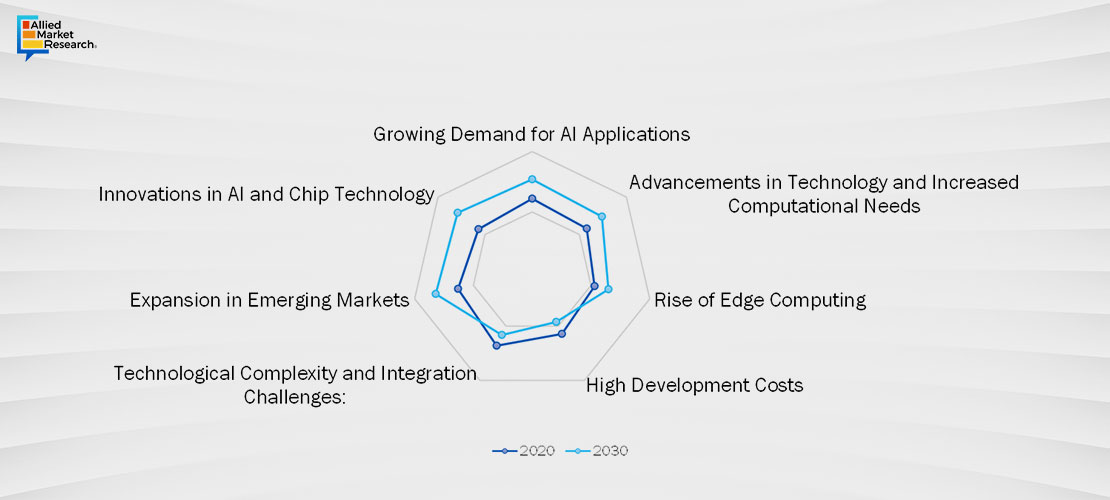Artificial Intelligence Chip Industry

The Artificial Intelligence chip market is a rapidly growing section, pivotal in advancing the ability of artificial intelligence across numerous industries. These specialized chips are designed to efficaciously handle Artificial Intelligence-related operations. The market is characterized by using severe opposition and innovation, with key gamers consisting of NVIDIA, Intel, AMD, and newer entrants like Google and Apple developing proprietary Artificial Intelligence chips. The demand for Artificial Intelligence chips is driven by way of their ability to offer multiplied processing for Artificial Intelligence packages, higher power performance in comparison to standard CPUs, and the functionality to address large volumes of information in real-time.
Elevating Computing Performance with Advanced Artificial Intelligence Chips
In the dynamic panorama of technology, industry giants are at the forefront of making modern Artificial Intelligence chips which are both powerful and efficient. NVIDIA has emerged as a distinguished force its graphics processing units (GPUs), which have now come to be fundamental in the realm of Artificial Intelligence chip development. These GPUs are considerably applied in deep learning and various Artificial Intelligence applications. Intel, no longer to be outdone, offers its very own array of Artificial Intelligence chips, which include the Nervana and Movidius series.

The significance of Artificial Intelligence chips extends into several sectors, with the automobile industry being a top instance. Here, Artificial Intelligence chips play a pivotal role in advancing self-using technology. Tesla's choice to combine custom-designed Artificial Intelligence chips in its independent cars highlights the crucial importance of these chips in processing real-time data for safe navigation. Moreover, the influence of Artificial Intelligence chips is profoundly felt in the consumer electronics sector.
Artificial Intelligence Chips: Fueling Innovation and Efficiency in Data Centers
The landscape of data center operations is witnessing an extensive shift with the increasing adoption of Artificial Intelligence chips, which might be pivotal in coping with complicated regulations and processing massive record volumes with more efficiency. Unlike traditional CPUs, these specialized chips are tailored for faster and greater effective data processing, a key aspect in cloud computing and big data analytics.
An interesting example is Google's Tensor Processing Unit (TPU), especially engineered to accelerate system learning workloads. This innovation appreciably enhances the performance of Google's cloud offerings, showcasing the importance of Artificial Intelligence chips in optimizing cloud computing infrastructures. Similarly, Amazon Web Services (AWS) has advanced its own Inferential chips. These chips are centered on optimizing machine mastering inference, thereby enhancing the performance and effectiveness of AWS's cloud-based solutions.

The growing demand for AI applications across various industries like healthcare, automotive, finance, and consumer electronics is fueling the need for specialized AI chips and is expected to drive the market in the future. These chips are crucial for efficiently handling complex AI tasks such as machine learning, natural language processing, and computer vision. Moreover, the technological advancements and the increasing computational demands of complex AI algorithms and large datasets further highlight the need for AI chips that outperform traditional CPUs and show significant growth opportunities for the market. Additionally, the rise of edge computing, where data processing occurs closer to the source, calls for more efficient and powerful computing solutions, a role well-suited for AI chips.
Despite the promising outlook, the Artificial Intelligence chip market faces some significant challenges such as the high development costs create a barrier to entry for startups and smaller players in developing countries. The complexity of designing efficient and energy-efficient chips also contributes to the cost, which acts as a major entry barrier for new players in the market. Furthermore, the technological complexities and integration hurdles also pose a major restraint for the market growth as tailoring AI chips to a wide range of devices and applications can be a daunting task.
However, the future of the Artificial Intelligence chip market is overflowing with various opportunities such as the growth of markets in developing economies, as these economies invest in technology, offers immense potential for market expansion in regions adopting AI advancements across sectors like healthcare, retail, and manufacturing. Furthermore, the continuous innovations in AI, internet of Things and semiconductor technology present opportunities for developing new types of AI chips, such as those using next-generation materials or novel architectures. Moreover, it is safe to say that the improvements in AI technology globally can lead to more powerful, energy-efficient, and cost-effective chips, opening up new application areas and market possibilities.
Future Trends: Artificial Intelligence Shaping the Industrial Landscape of Tomorrow
The future of Artificial Intelligence in industries is marked with numerous promising trends:

- Enhanced Machine Learning Models: The development of more advanced machine learning and AI systems and models are expected to enable better prediction, automation, and optimization in business processes.
- Increased Adoption of IoT and Artificial Intelligence: ?The increase of the Internet of Things (IoT) will lead to smarter and extra interconnected business environments, fostering better statistics series and analysis. Further, this significant development in IoT and Artificial Intelligence is expected to permit real-time tracking and control of sources, improving performance, reducing operational prices, and permitting extra knowledgeable strategic decisions.
- Growth in Collaborative Robotics: The rise of collaborative robots will become more prevalent in industries, working alongside humans to enhance productivity and safety. These collaborative robots are designed to be more intuitive and adaptable, able to assist with a wide range of tasks while ensuring a safer work environment through advanced safety features and more precise operations.
- Sustainable Operations: ?A attention to sustainable and environmentally friendly practices could be crucial, with an emphasis on optimizing resource use and lowering waste. Industries will increasingly adopt green technologies and strategies to reduce their environmental impact. Moreover, this shift now not only helps in preserving herbal resources but also aligns with developing customer and regulatory needs for greater sustainable business practices.
Conclusion
The incorporation of Artificial Intelligence into several businesses represents a fundamental paradigm shift, bringing new degrees of performance, productivity, and innovation. As technology advances at a fast pace, industries should adapt and embrace Artificial Intelligence to hold and enhance their aggressive positions. Allied Market Research is dedicated to disseminating in-depth research and insights regarding the Artificial Intelligence sector. Our mission is to provide businesses with the knowledge and resources they need to properly manage the revolution in artificial intelligence. This endeavor requires identifying and evaluating key trends, challenges, and opportunities in this rapidly evolving sector. Through comprehensive knowledge and a proactive approach, industries are well-positioned to fully leverage Artificial Intelligence, thereby expanding their operations and securing a leading role in the future landscape of automation and efficiency.



